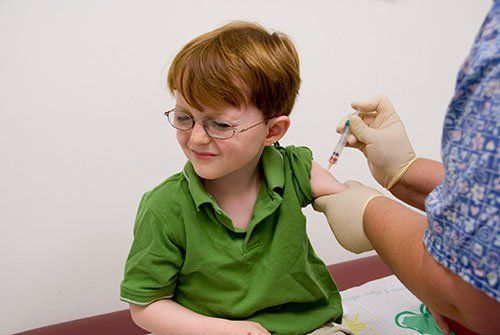OVERCOMING CHILDREN’S FEAR OF THE DREADED DOCTOR
Admin • December 23, 2021

Doctors appointments are sometimes stressful for children, but they often can't be avoided. Visits can make children nervous, especially when a child is sick. The next time you're taking an ill and anxious child to the doctor, use these tips to make the appointment a bit smoother for everyone involved.
Understand the Why Behind Your Child's Apprehension
From an adult perspective, a child's apprehension towards the doctor can seem out of place. However, it is helpful to understand the cause of the child's fear in order to address his or her concerns. There are many potential reasons, including exposure to graphic medical TV shows, discomfort experienced during a previous procedure, and foreignness of the office.
Also, a child's imagination comes into play. Children may have unrealistic expectations of a doctor's appointment that drives their fear. Invite kids to share their worries and the thoughts driving their fear of the doctor in order to give them a better understanding of what to expect.
Explain the Reason for Your Child's Visit
It's difficult for children to understand the purpose of visiting a doctor, especially if it's a regular checkup without a tangible reason for the child to see the need for a doctor. During these times, let the child ask questions about the importance of the visit.
Relay any difficult questions they ask to doctors and nurses for an opportunity for children to converse with them. Allow the doctor to explain the answer and preface what the child will experience, like the feeling of a rough tongue dispenser or the touch of a cold stethoscope. This will build rapport and take away some shock factor.
Prepare Your Child for Shots
Certain things during a doctor's appointment may trigger a child's fear, such as shots. Shots generally conflict discomfort on a child. Help manage the stress by letting the child know beforehand when a shot is going to be administered.
When they get a shot, engage the child in attempts to distract from the anticipation and pain. Keep the child from watching the needle enter his or her arm. You can tell jokes, talking about enjoyable activities, playing a game, etc. Be present with children during these times for comfort or a hand to squeeze.
Validate and Comfort Your Child's Emotion
Validation is crucial to address children's worries about doctors. Help them to feel reassured by allowing them to be heard and understood. Parents, who relate to their children's fears, become a role model. Since children see how they have overcome those fears, parents can offer support to anxious children to empower them to do the same.
Some appointments are likely to be more stressful than others. During these visits, allow a child to bring along something comforting from home, such as a favorite stuffed animal or toy. It gives the child a safety blanket to have during moments of uneasiness.
Play Doctor with Your Child
In a comfortable environment, encourage children to play the role of a doctor. Parents, siblings, pets, or stuffed animals can be the patients. Make the connection that just as the child works to heal his or her patients for their wellbeing, the child's doctor does the same. It is another point of relation between a child and a doctor.
When a child pretends to be a doctor, it can humanize doctors in a child's mind. The medical world is challenging for adults to understand, let alone children. So breaking down barriers that alienate a doctor from a child can break down some of the child's fear of the doctor.
There are many ways to decrease stress during a doctor's appointment. In tandem with these tips, it is important to find medical centers that ease the process of a doctor's appointment for a child.
Contact us at Hampstead Medical Center PC to address child health care concerns, from regular check-ups to exams to vaccines, in a caring and professional manner.

The IUD, or intrauterine device, is one of the most effective methods of birth control available. Unlike birth-control pills, you do not need to remember daily to administer medication, and the device itself lasts longer than shots and is easier to use than rings. Many women find all of these benefits desirable for a birth-control method. There are two general types of IUDs available to women. The first type is the copper IUD, and the other is hormonal. Which one is right for your personal birth-control needs?

Although the risk of cardiovascular disease increases as you get older, many people who die suddenly of a heart attack didn't previously know they had heart disease. That's why identifying risk factors for heart attack and stroke is so critical to cardiovascular health. Fortunately, with regular exams and the many types of screening tests available, doctors can detect early signs of heart disease.

Even if you've never had cause to doubt your thyroid function, if you're a female who has recently given birth, you may be at risk for thyroid issues. An estimated 12 percent of Americans deal with thyroid trouble at some point during their adult lives, and women are significantly more likely than men to develop a thyroid-related ailment. Unfortunately for new mothers, many of the most common signs of an underactive thyroid (like weight gain, mood swings, fatigue, and irritability) are also quite common for those dealing with a newborn's frequent night wakings and the realities of a post-partum body. Read on to learn more about some common (and not-so-common) signs that you could be dealing with a pregnancy-induced thyroid problem as well as some treatment options that can be safely administered or performed while you're breastfeeding. What Can Cause Thyroid Problems During Pregnancy? As with many other hormonal disorders, there are often more questions than answers when it comes to thyroid function. However, researchers have pinpointed a few factors and health conditions that can raise the risk of a woman’s developing a thyroid issue during or immediately after pregnancy. For example, while only around 7 percent of women are at a general risk of developing postpartum thyroiditis, this risk increases to 25 percent for women who have Type 1 diabetes or who dealt with elevated antithyroid antibodies during pregnancy. Women whose anti-peroxidase (anti-TPO) antibodies were elevated during pregnancy may have a 1 in 2 chance of developing postpartum thyroiditis, and those who have dealt with thyroid issues in the past (or during previous pregnancies) also deal with a significantly increased risk. In other cases, thyroid problems may have no cause that can easily be pinpointed; the rush of various hormones during pregnancy and the strain they can put on various systems, including the endocrine system, can create a sort of "perfect storm" in which thyroid problems may thrive. What Are Some Signs You're Dealing With Post-Pregnancy Thyroid Issues? Thyroid problems can take a number of forms, including hypothyroidism (an underactive thyroid), hyperthyroidism (an overactive thyroid), Graves' disease (an autoimmune condition that causes goiter), or Hashimoto's disease (an autoimmune condition in which the body's immune system attacks healthy thyroid cells, eventually stopping all thyroid function). The signs and symptoms for each thyroid disorder are unique and often at opposite sides of the spectrum. For example, hypothyroid patients often report being cold, having dry skin, sleeping more than normal, or gaining weight without trying while hyperthyroid patients sweat profusely, suffer from insomnia, and can lose a significant amount of weight in a brief period. Postpartum thyroiditis often manifests as either an underactive or overactive thyroid, which usually normalizes itself in a few months. Symptoms lasting longer than that or that appear to be getting worse may necessitate medical intervention. What Treatment Options for an Underactive Thyroid Are Best for New Mothers? Whether you suspect you have postpartum thyroiditis or have been formally diagnosed, you may be worried about how your potential treatment options could impact your ability to breastfeed and what effect (if any) they might have on your child. Fortunately, there are a number of effective options from which to choose. If your postpartum thyroiditis is deemed autoimmune in origin, there is some evidence that taking selenium supplements could help normalize your thyroid function without requiring you to take hormonal medication (which might pass into your milk supply). If your symptoms aren't severe and don't impact your daily life, you may instead opt for watchful waiting, maintaining contact with your doctor and reporting any worsening symptoms but avoiding medication or other treatment for the time being. However, if your doctor recommends supplemental thyroid hormone, this usually means some intervention is necessary to prevent permanent damage to your thyroid and the organs and systems that depend on a steady dose of hormones. Make an appointment with Hampstead Medical Center PC to get started taking care of your health.

Family physicians and medical office staff help you in facilities that are patient- and doctor-friendly. Everything your doctor needs to examine, treat, and explain your condition is within reach–from hand washing sinks to your medical history. When you have a family member healing at home, it's wise to create the same sort of convenient space on a smaller scale. If you or a family member has been diagnosed with a serious condition or been hospitalized, you or the family member may eventually be sent home to recover. If the recovery will be a long-term process, there are ways to make your living quarters easier on both the patient and the caregivers. Here are a few tips to ready your residence for a recovering patient.






